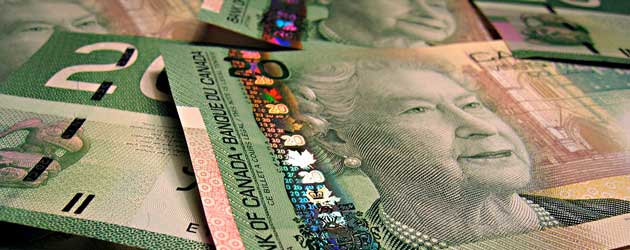
Fed Chairman Ben Bernanke’s mixed speech saw the Canadian Dollar drop against its American rival, trading within the region of an 8-month low.
The Canadian Dollar Exchange Rate was in the region of 0.9740 against the US Dollar as of 10:50 pm GMT
The ‘Loonie’ dropped to an over eight-month low against the US Dollar yesterday, and the currency’s bearish relationship with its US counterpart looks set to continue for the foreseeable future.
Several factors contributed to the ‘Loonie’ losses. Most significantly, oil – one of Canada’s most significant exports – slid to a seven-week low, while Federal Reserve Chairman Ben Bernanke delivered a two-part testimony in Washington.
Although Bernanke defended the current fiscal approach adopted by the US he had warnings to issue too.
During his testimony to the Senate Banking Committee Bernanke asserted ‘We do not see the potential costs of the increased risk-taking in some financial markets as outweighing the benefits of promoting a stronger economic recovery. Inflation is currently subdued, and inflation expectations appear well anchored.’
Although these comments lent support to the US economic outlook, especially when viewed in conjunction with yesterday’s stronger-than-forecast housing and consumer confidence data, Bernanke went on to discuss an issue which has the potential to throw the nation’s recovery off kilter.
Bernanke stressed that the series of automatic spending cuts scheduled to begin on the 1st of March would be a ‘burden’ and could cause significant damage to the ‘still moderate’ US economic recovery.
As the US is Canada’s biggest trading partner, a slowdown could have series repercussions for the world’s eleventh-largest economy.
As the head of currency strategy with the Bank of Nova Scotia asserted: ‘Bernanke’s focus on the increasing burden the economy will bear from the fiscal side is negative for US growth and therefore negative for Canada.’
Bank of Canada Governor Mark Carney also contributed to the Canadian Dollar’s decline when he stated that some of the downside risks to the economy he had previously highlighted are beginning to make themselves felt. Carney went on to assert that while inflation seems in line with forecasts, Canadian growth in the fourth-quarter of 2012 may have been slower than the BOC predicted. He added that policy makers remain of the opinion that interest-rate increases have become less urgent.
Meanwhile, a recent Medley Global Advisors report is believed to speculate that the Canadian central bank will keep its policy unaltered when it meets next week, although this could change if export and business investment data continues to disappoint.
A managing director with the Canadian Imperial Bank of Commerce commented: ‘This Medley report says the Bank of Canada [said last month] that tightening is perhaps less imminent, and it basically says if the data continues to be poor, the references for higher rates could be scrapped.’
If the spending cuts come in to effect in two days time the ‘Loonie’ could lose further ground against the US Dollar and the majority of its other most traded counterparts. Friday’s Canadian fourth-quarter GDP is also likely to trigger significant volatility.
US data, including Durable Goods Orders, as well as developments in Europe and on the commodity market are likely to be the main causes of fluctuations in the Canadian Dollar today.
Current Canadian Dollar Exchange Rates
The Canadian Dollar to Euro (CAD/EUR) exchange rate is trading at 0.7451
The Canadian Dollar to Pound Sterling (CAD/GBP) exchange rate is trading at 0.6445
The Canadian Dollar to US Dollar (CAD/USD) exchange rate is trading at 0.9740
The Canadian Dollar to Australian Dollar (CAD/AUD) exchange rate is trading at 0.9560
The Canadian Dollar to New Zealand Dollar (CAD/NZD) exchange rate is trading at 1.1818
The Canadian Dollar to Japanese Yen (CAD/JPY) exchange rate is trading at 89.2753
These exchange rates were correct as of 10:50 pm GMT

Comments are closed.